In order to work in Japan, foreigners need the right kind of residence status. There are various kinds of residence statuses based on the purpose of one’s stay in Japan, and not all of them give a person the right to work, or if they do, they may restrict them to specific industries or to a specific time period. They may even make it impossible to renew your status of residence. It can get a little complicated, but in order to work in Japan, you need to understand this entire system. We’ll try to help with that!
Table of Contents
- The Basics of Work Visas (Residence Statuses)
- Types of Work Visas (Residence Statuses)
- Residence Statuses and Permitted Occupations
- How to Apply for a Residence Status and What Documents Will You Need?
- How to Check and Prove Your Work Visa Status
- Why Your Residence Status Application Was Approved or Rejected
- What to Do When Your Application Gets Rejected?
- Applying for, Renewing, or Changing Your Residence Status: Things to Keep In Mind
- Apply for a Work Visa Through a Notary Public!
- This Article Written Under the Supervision of the IVY Associates Legal Advisors
The Basics of Work Visas (Residence Statuses)
After foreigners arrive in Japan, they can only engage in certain activities if they have the right kind of residence status for them. In order to work, you’ll need a residence status permitting involvement in the industry of your choosing. These kinds of statuses are typically called “work visas,” although that’s not their official name. The important thing to remember is that not all residence statuses let you to work in Japan. You’ll need one that specifically allows you to be employed by a Japanese company.
Types of Work Visas (Residence Statuses)
Japan’s residence statuses can broadly be divided into four categories: those allowing you to work, those based on personal status, those disallowing you to work, and those specifying the kind of work that you’re allowed to do. These statuses can restrict your ability to seek employment, the scope of the work you’re allowed to engage in, as well as how long you’re allowed in the country.
1. Residence Statuses That Allow You to Work (With Limitations)
The kinds of jobs that foreigners with the right residence status can engage in while in Japan are restricted to specialized and technical fields that aid the Japanese economy. The most popular working residence status is Engineer/Specialist in Humanities/International Services (ESHIS), which is issued to about 272,000 people (excluding Technical Training Interns).
A Technical Intern Training residence status also allows foreigners to work at Japanese companies so that they can obtain technical skills and knowledge that will aid the development of their home countries. There are currently ~411,000 technical interns residing in Japan. They are allowed to stay in the country for a maximum of five years.
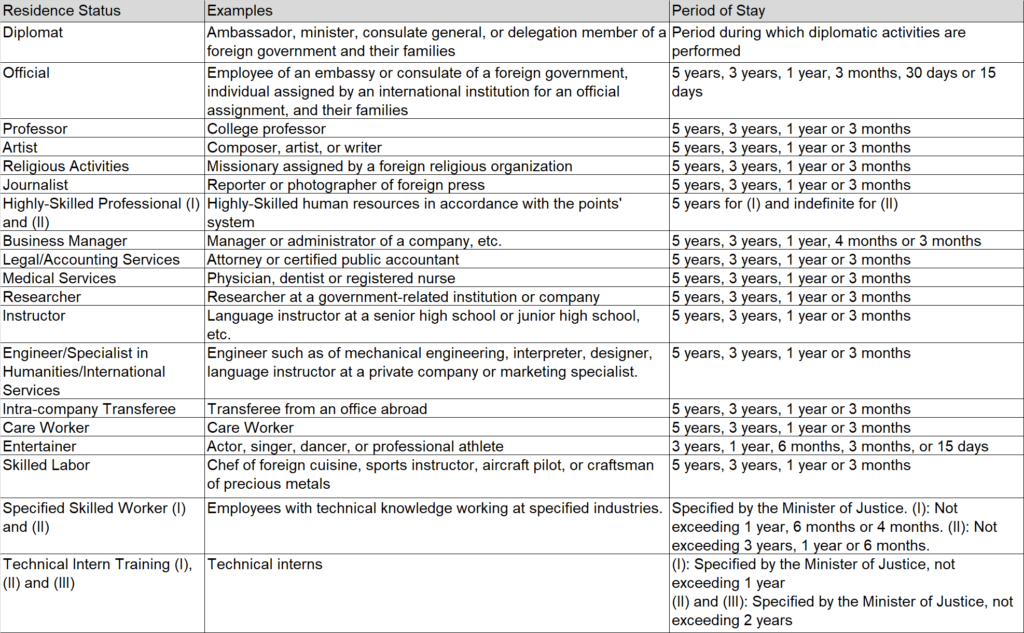
In April 2019, Japan created two new residence statuses: Specified Skilled Worker (I) and (II). They allow foreigners to work in 14 Japanese industries that have been experiencing chronic workforce shortages. The Specified Skilled Worker (I) can be valid for 1 year, 6 months, or 4 months, and while the status can be renewed, a person’s total stay in Japan under this residence status cannot exceed five years. The Specified Skilled Worker (II) can be valid for 3 years, 1 year, or 6 months, and the status can be renewed indefinitely.
2. Residence Statuses Based on Personal Status
Residence statuses based on personal status allow you to work in Japan on the same terms as Japanese people. They include long-term residents (mostly non-Japanese people of Japanese descent), special permanent residents (those covered under the 1991 Special Act on the Immigration Control of, Inter Alia, Those Who Have Lost Japanese Nationality Pursuant to the Treaty of Peace with Japan), spouses of Japanese nationals, permanent residents, and spouses of permanent residents. Permanent residents are allowed to stay in Japan indefinitely, while the maximum permitted period of stay for everyone else is five years (though the statuses can be renewed).

3. Permitted Activities and Working in Japan
Japan’s residence statuses permit 46 different activities in accordance with Working Holiday and Economic Partnership agreements, including nurses and certified care worker candidates. This includes the new Specified Activity #46, established in 2019, that of flexible work for foreigners who’ve graduated from a Japanese university and passed a Japanese-Language Proficiency Test (N1 level) or have scored at least 480 points on the Business Japanese Proficiency Test.

4. Residence Statuses That Disallow You From Work
Those foreigners admitted to Japan for reasons other than work (cultural activities, study, research, being a dependent, etc.) are, as a rule, barred from employment. However, you can apply for a permission for activities outside your status of residence (資格外活動許可, shikaku-gai katsudo kyoka) at the Immigration Bureau, and if it’s accepted, you may be granted limited rights to work in Japan. A lot of foreign students use this to work part-time jobs. This right is granted under the assumption that it will not interfere with the primary activity designated by your residence status, and in the case of students, whose primary activity in Japan is education, it means being allowed to work up to 28 hours a week (except for work at businesses that “affect public morals” like the sex industry or some kinds of entertainment/amusement trades, which is banned).
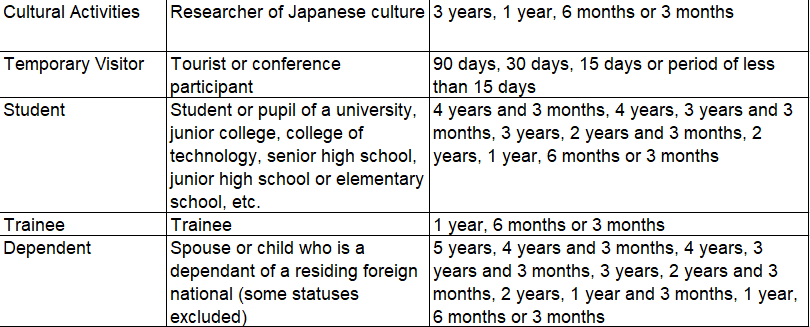
Number of Foreign Residents in Japan, Immigration Services Agency, Ministry of Justice (as of March 27, 2020) – Japanese only
Residence Statuses and Permitted Occupations
The kind of work you’re allowed to do will differ depending on your residence status. Whether you’ll be granted a work residence status depends on how close the activities of a job that you’re pursuing are to the activities permitted by the status, as well as your experience and skills. Up until now, working residence statuses have mainly been granted to two kinds of applicants: specialized skilled workers and technical training interns. However, due to Japan’s declining birthrate and the resulting workforce shortage, new systems are being put into place to allow more foreign workers into Japan. Let’s compare and understand the differences between the industries/occupations permitted by current residence statuses.
Engineer/Specialist in Humanities/International Services (ESHIS)

The Engineer/Specialist in Humanities/International Services residence status is meant for foreign workers engaging in an activity that makes use of their highly-specialized, unique knowledge. It allows for work in three kinds of industries, including technical ones like computer engineering, accounting or finances, and consulting, or ones requiring a working knowledge of and sensitivity for foreign cultures, including general humanist professions, international sales, and interpretation.
In order to qualify for this residence status, you’ll need the right kind of education and a specified number of years of professional experience in your industry. The education threshold is graduating from a Japanese or foreign junior college or from a Japanese vocational school. You’ll need to file your diploma and certificate of achievements when applying for this status. As for professional experience, you’ll need to have worked in an engineering or humanist field, with proven results, for at least 10 years, which will have to be verified with a certificate of employment etc. This means that unskilled labor where a person learns a trade by repeating a task without studying it academically does not count. This disqualifies people who’ve worked the line in a factory or waited on customers in a restaurant.
Specified Activity #46

A Specified Activity is any activity which individual foreign workers can engage in that’s not covered by a specific residence status but rather designated by the Minister of Justice on a case by case basis. It’s to accommodate activities not covered under the law in an increasingly diverse Japanese society that’s employing more and more foreign workers. The Specified Activity #46 was established as a new residence status in May 2019 for foreigners who’ve graduated from a Japanese university or graduate school. Up until now, foreign students who’ve graduated from a Japanese university could only engage in very limited post-graduate activities. Many were also unable to extend their residence statuses. The Specified Activity #46 was established to help with that. Thanks to this new residence status, even people who don’t work in professions necessitating “highly-specialized technical or foreign language knowledge” (as required by the ESHIS) can now continue to live and work in Japan after they graduate from a Japanese university or graduate school.
In addition to the education condition stating that the recipient of the Specified Activity #46 status needs to have graduated from a Japanese university or graduate school with a degree, they also need to have passed the Japanese Language Proficiency Test (N1 level) or scored at least 480 points on the Business Japanese Proficiency Test. (The test conditions are waived if the person majored in Japanese.)
The recipient of this residence status also needs to meet some employment conditions. They have to be working full-time (part-time and temp work does not qualify), they need to be making at least as much as their Japanese coworkers in the same position, their job should necessitate fluent Japanese communication skills, and it should also allow them to utilize the knowledge obtained at university (although the job doesn’t have to be directly related to their major).
However, besides that, this status does not specify any industry that a person has to work in, as long as it’s not unskilled labor where the use of Japanese is not necessary. The permitted period of stay under this residence status is up to 5 years. As long as you keep working, you can keep renewing this status, and it even recognizes your dependents, so one can build their entire career under the Specified Activity #46 status. You can even go on to become a captain of industry. If you plan to live and work in Japan for a long time, you should consider applying for this status.
Specified Skilled Worker (I) and (II)

Specified Skilled Worker (I) and (II) are new residence statuses created in April 2019. It allows foreign workers to seek employment in 14 specified industries that have been suffering from a workforce shortage. Specified Skilled Worker (II) requires a little more proficiency and is harder to get. Specified Skilled Worker (I) covers care-giving, cleaning buildings, agriculture, fishery, food and beverage manufacturing, food service, forges and foundries, industrial machinery manufacturing, electric/electronic information related industries, construction, shipbuilding, automobile maintenance, aviation, hospitality, and others. Currently, you can also apply to work in construction and shipbuilding as a Specified Skilled Worker (II).
In order to qualify for this status, a person has to be 18 or over and needs to have passed their desired industry’s skill evaluation tests as well as the Japanese Language Proficiency Test (N4 level or higher), although foreign workers who’ve successfully completed the Technical Intern Training (II) program are exempt from this. Additionally, the collective period of stay in Japan under Specified Skilled Workers (I) cannot exceed 5 years. After 5 years, a Specified Skilled Worker (I) residence status cannot be renewed. Specified Skilled Worker (II), on the other hand, doesn’t have a collective period of stay limit and can be renewed indefinitely. Unlike the “highly-specialized technical or foreign language knowledge” requirement of ESHIS, Specified Skilled Workers can work in unskilled labor industries, so all foreign students who apply for this status have a lot of options open to them after graduation.
Part-Time Work

Whether you can work a part-time job or not depends on the scope of your residence status’ permitted activities. Additionally, even if your status allows you to work a part-time job, it may limit you to only certain kinds of industries. In order to work a part-time job that’s fundamentally different from the activities permitted by your status, you’ll need to obtain a permission for activities outside your status of residence. For example, ESHIS is a work status, but it limits the jobs available to you to translation and interpretation, so you can work part-time as an interpreter but not as a part-time university lecturer or an advertising model. In order to do the latter, you’ll need the permission for activities outside your status of residence.
Other statuses that allow you to work part-time jobs are Students and Dependents. However, since they are not work statuses strictly speaking, you’ll need a permission for activities outside your status of residence (like with ESHIS). The permission limits the number of hours you can work part-time to 28 per week. (However, work at businesses that “affect public morals” like the sex industry or some kinds of entertainment/amusement trades is banned.) You need to apply for the permission in person at your local Immigration Bureau, and the process can take anywhere from 2 weeks to 2 months. Be careful, because if you try to work before you get the permission, both you and your employer can get fined.
Differences Between Kinds of Foreign Professionals
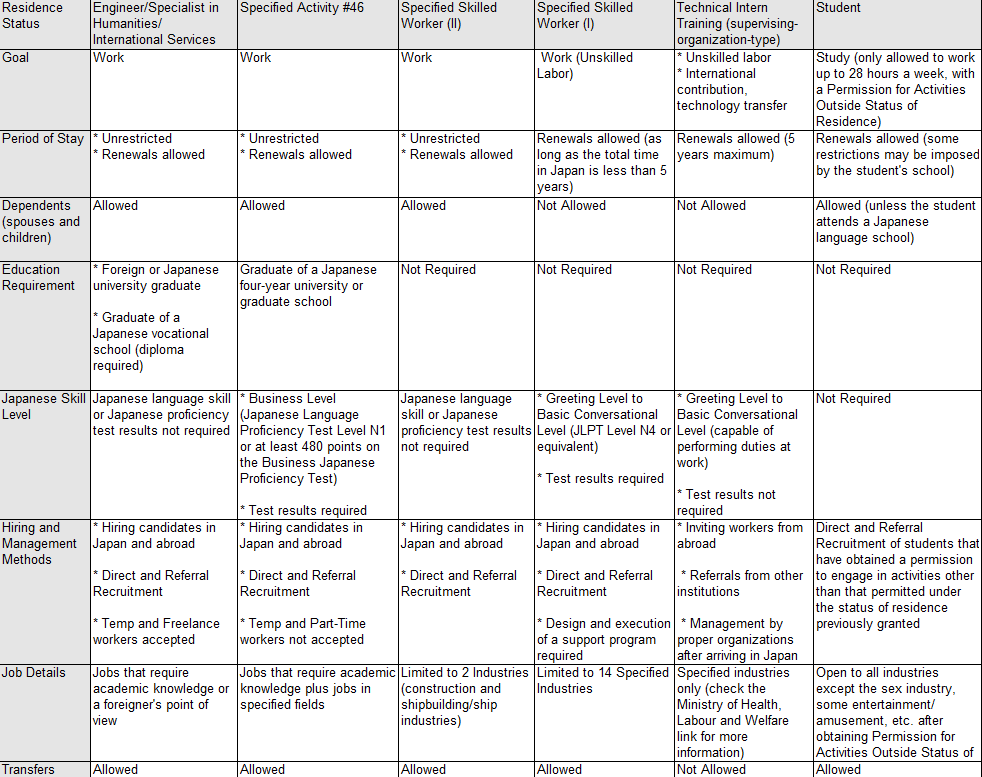
References:
- Technical Intern Training System, Ministry of Health, Labour and Welfare
- Common Requirements of The Technical Intern Training Program, Ministry of Health, Labour and Welfare
- Chishiki Zero Kara no Gaikokujin Koyo, Koichi Takeuchi
How to Apply for a Residence Status and What Documents Will You Need?

The documents that you’ll need to apply for a work visa differ from person to person. It all depends on if you’ve worked in Japan before, if you’re transferring, if you’re applying from abroad, etc. Every case is different, so you should inquire about it with the company that wants to hire you.
1. Going From Foreign Student to Worker
All foreigners working in Japan need a work visa (a residence status that allows you to seek employment), so even if you pass your employment exams but only have a Student status, which does not allow you to work full-time, you will not be able to work at a Japanese company. So if you’re ever in this situation, you’ll first need to change your residence status.
In order to change your residence status from Student to something else, you’ll need to file an Application for Change of Status of Residence, a notification from your school that you’re no longer a student there, and other additional documents. You, or a notary public/lawyer representing you, can file the documents at your local Immigration Bureau. You’ll have to prepare some of the documents yourself while others will come from the company hoping to hire you, so make sure you don’t forget to ask for them. Another thing to keep in mind is that your potential employer’s documents need to be stamped with their official seal.
Documents prepared by the applicant
• The applicant’s passport (or travel certificate) plus their residence card.
(Please make sure that your passport is up to date.)
• Resume
• Application for Change of Status of Residence (differs depending on the residence status)
(Requires a photograph: 4×3 cm, plain white background, taken within the last 3 months.)
• Statement explaining reason for applying (voluntary; any format). The statement usually talks about the reason for seeking employment, the duties at your future job, your university major/field of study and how it applies to the job etc. It may help with your case.
Documents prepared by the employer (company)
• Copy of employment contract
• A certified copy of the company’s commercial registration and a copy of their financial statement (statement of profit and loss)
• Legal record total table
• Information on the company (official pamphlet or website)
• Statement detailing the reason for employment (voluntary; any format). Usually details the hiring process, the reason for choosing the candidate, their duties etc.
Documents obtained from the university
• Diploma or certificate of expected graduation
• Grade transcript (if it relates to the job)
Those should be most of the documents you’ll need to apply, but many companies will also have an experienced employee in charge of the entire process, so it’d be best to consult with them and follow their lead. Your application should be processed within 1-2 months unless it’s close to graduation season when the Immigration Bureau gets swamped, so you should file your application 3-4 months before graduation.
2. Transferring to Another Company
Those foreigners with a work residence status who wish to transfer need to file a notification on their contracting organization (所属機関等に関する届出, shozoku kikanto ni kansuru todokede). This needs to be sent to the Immigration Services Agency no later than 14 days after transferring. Failure to do so may result in a fine of up to 200,000 yen and a reduction of your period of stay during your next residence status renewal. Whether you also have to change your status or not depends on the details of your new job. We’ll now look at some of the most common cases.
No Change In Job Details (Just a Transfer to a Different Company)
When a foreign worker changes companies but continues to do the same kind of work, they don’t need to change their residence status and only have to file a notification on their contracting organization. However, nobody is actually confirming whether the details of your new job match the details of your previous job and, consequently, the activities permitted by your status. There have been cases where this has resulted in workers having their status renewal applications rejected. In order to avoid that, you should apply for a Certificate of Authorized Employment (就労資格証明書, shuro shikaku shomeisho), which is a document that you can get anytime and that certifies that your current job falls within the scope of the activities permitted by your residence status. You are not obliged to get one, but doing so greatly raises the chances of your status renewal application being accepted. Additionally, if it’s 3 months or less before the end of your permitted period of stay, you can apply for an extension of period of stay after submitting a notification on your contracting organization, without first obtaining a Certificate of Authorized Employment.
Documents prepared by the applicant
• Current residence card
• A notification on their contracting organization
• (Certificate of Authorized Employment)
Change in Company and Job Details (Though Still Within the Scope of the Residence Status)
When a foreign worker changes companies and jobs, but the job still falls within the scope of their current residence status, then they don’t need to change their status. For example, if an interpreter transfers to another company where they start to work as an IT engineer, it means that the details of their job have changed, but both of them are covered under the Engineer/Specialist in Humanities/International Services status. In this case, same as before, you only need to file a notification on your contracting organization, but in order to make sure that the details of your new job really fall within the scope of your residence status, it would be best if you also obtained a Certificate of Authorized Employment (see previous section for more details). Also identically to the previous section, if it’s 3 months or less before the end of your permitted period of stay, you can apply for an extension of period of stay after submitting a notification on your contracting organization, without first obtaining a Certificate of Authorized Employment.
Documents prepared by the applicant
• Current residence card
• A notification on their contracting organization
• (Certificate of Authorized Employment)
Change in Company and Job Details (With New Duties Falling Outside the Scope of Current Residence Status)
When your new job duties fall outside the scope of your current residence status, you’ll first have to change your status. For example, if you’re a school faculty member working in Japan under the Instructor status but then transfer to a new job as an interpreter (which falls under the Engineer/Specialist in Humanities/International Services status), then this situation applies to you. First, you’ll have to file all the necessary documents for a change of status of residence at your local Immigration Bureau. Same as when you applied for your original status, you’ll be granted a new one if your experience and skills are a good fit for your new job. However, if it’s decided that your experience and skills aren’t very relevant to your new job, your application may be rejected.
Documents prepared by the applicant
• Current residence card
• A notification on their contracting organization
• Application for Change of Status of Residence (plus other necessary documents)
Transferring With a Specified Activity #46 Residence Status
The Specified Activity #46 residence status is granted to applicants applying for a job at a specific company, so even if they transfer to a new company with the same job details as before, they still have to file an Application for Change of Status of Residence to receive a new Specified Activity #46 status for the new company.
Documents prepared by the applicant
• Current residence card
• A notification on their contracting organization
• Application for Change of Status of Residence
Documents Necessary to Obtain a Certificate of Authorized Employment
• Application for a Certificate of Authorized Employment
• Permission for activities outside your status of residence (if applicable)
• Current residence card or special permanent resident certificate
• Passport or certificate of status of residence
• Tax-income certificate (obtained from previous employer)
• Certificate of quitting (obtained from previous employer)
• Documents summarizing the new employer (certified copy of their commercial registration, copy of their financial statement, company guide, etc.)
• Employment contract, notification of appointment, official salary statement etc. (obtained from new employer)
3. Getting Hired by a Japanese Company While Abroad (First Time Applying for a Residence Status)
Foreigners residing abroad who get hired by Japanese companies must file an Application for a Certificate of Eligibility for resident status before entering the country. Normally this application is filed by the foreign applicant or someone legally acting on their behalf, but because in this case the applicant is residing abroad, their future employer usually handles it for them.
The Application for a Certificate of Eligibility will take about 3 months to process. After you receive your application, fill it out and file it in person, together with your visa application and all other necessary documents, at your local Japanese embassy or consulate. Once you are issued a visa, you will be able to enter Japan. (A visa is NOT a residence status; it’s a stamp that allows you to enter the country.) Upon entering Japan for the first time, your new visa will be inspected and you will be granted a status of residence and a permitted period of stay. With some exceptions, if you’re entering Japan through a large airport, you’ll also be granted a residence card. You are allowed to work in Japan from the moment you receive your card.
Applying for your first residence status can be difficult. A lot of the procedures are complicated, and you will be met with many unfamiliar things at every step, which is why it’s important to do everything carefully. Don’t be afraid to consult with the person responsible for helping out foreign workers at the company you’re going to work for. They’ll tell you what to prepare, the documents you’ll need, the schedule, and anything else you need to know.
Documents prepared by the applicant
• Passport
• ID photo x 2 (4×3 cm, plain white background, taken within the last 3 months)
• Diploma or certificate of expected graduation or resume
• Japanese-Language Proficiency Test certificate (voluntary)
Documents prepared by the employer (company)
• Application for the issuance of a certificate of eligibility for resident status
• Copy of employment contract
• A certified copy of the company’s commercial registration and a copy of their financial statement (statement of profit and loss)
• Legal record total table
• Information on the company (official pamphlet or website)
• Statement detailing the reason for employment (voluntary; any format). Usually details the hiring process, the reason for choosing the candidate, their duties, etc.
4. Getting a Job Offer With Less Than Three Months Left on Your Permitted Period of Stay
If you get a job offer from a different company with less than three months left on your permitted period of stay, then you should apply for an extension of period of stay immediately after filing your notification on your contracting organization. You can do it at your local Immigration Bureau, with the whole procedure taking about a month. Generally, you should apply for a status renewal before your period of stay is up, because if you don’t, you will be classified as an unlawful resident, which might mean heavy criminal penalties for yourself and your employer, so be mindful of that.
You can get all the necessary paperwork at your local Immigration Bureau, or you can download them using the links below:
- Immigration and Refugee Documents (Ministry of Justice homepage; original Japanese)
- Application for Certificate of Eligibility
- Application for Change of Status of Residence
- Application for Extension of Period of Stay
- Application for Issuance of a Residence Card
- Application for Permission for Activities Outside Status of Residence
- Application for Certificate of Authorized Employment
- Notification on the Contracting Organization
How to Check and Prove Your Work Visa Status
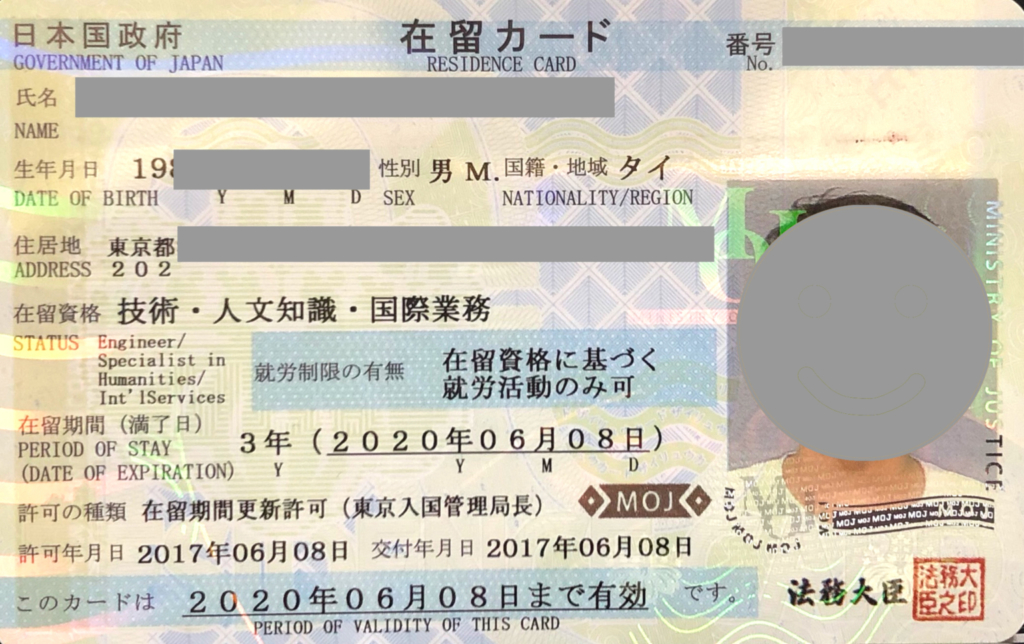
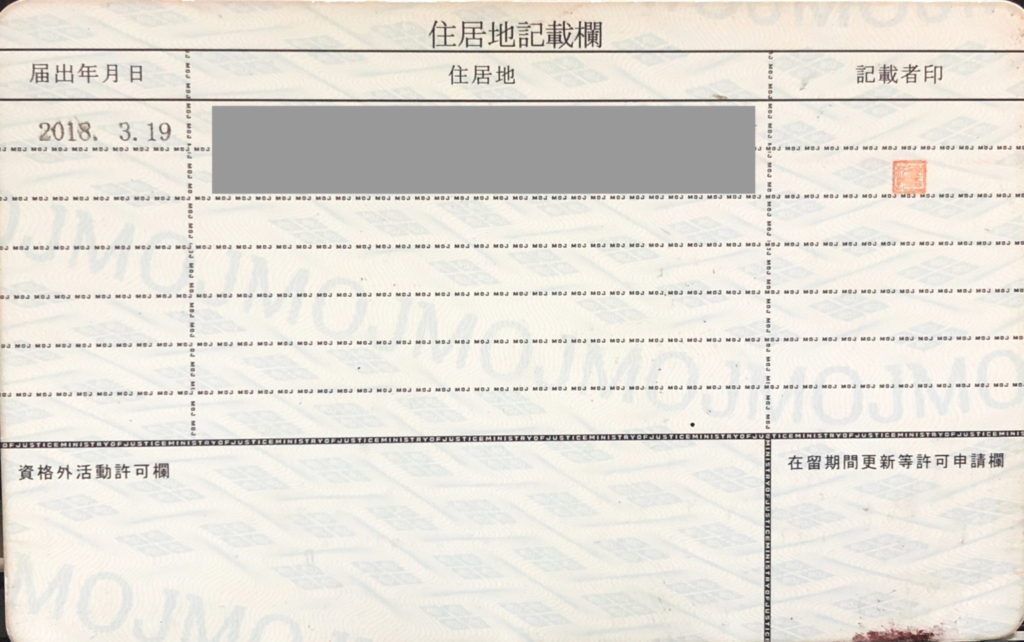
To find out if your residence status allows you to work, or to confirm the scope of your permitted activities for the purposes of employment, all you have to do is look at your residence card. First, look at the front at the 就労制限の有無 (Work Restrictions) section. If it says 就労制限なし (No Restrictions), then that means you’re free to conduct any kind of work in Japan. If it says 在留資格に基づく就労活動のみ可 (Work Permitted In Accordance With Residence Status), then it means you can only engage in activities permitted by your status. If it says 指定書により指定された就労活動のみ可 (Work Permitted Within Specified Scope), it means your status is a Specified Activity, in which case your permitted activities are restricted to the scope specified by the Minister of Justice. For more information, please consult the note in your passport.
If it says 就労不可 (Work Not Permitted) then it means that you’re not allowed to work in Japan, but if you obtain permission for activities outside your status of residence, you will get a stamp stating so on the back of your card, so don’t forget to show it when asked. The permission will say either that you’re allowed to work up to 28 hours a week (excluding the sex industry, some entertainment/amusement, etc.) or that you’re allowed to engage in activities specified by your permission. If it’s the latter, you’ll also need to present your permission when asked.
Why Your Residence Status Application Was Approved or Rejected
Whether an applicant will be granted a work visa (i.e. a residence status that allows them to work) depends largely on how well they meet the qualifying conditions for the status. With some exceptions, residence statuses are only granted to people applying for jobs that are relevant to their expertise and experience. For example, if you’ve graduated from an engineering department of a four-year college and wanted to work in the development of electronic devices at a Japanese company, under the same conditions as Japanese people, then your application would probably be accepted, because the job details were relevant to your major. However, if you specialize in interior design and wanted to work as a translator/interpreter, then chances are that your residence status application would be rejected, because the two are not connected. Even if you’re not applying for a specified skill worker status, the Immigration Bureau will be reluctant to approve your application if you apply for factory line work or waiting on customers etc., which are classified as unskilled labor.
Another thing you should be mindful of are past indiscretions. If you’ve broken the Immigration Control and Refugee Recognition Act in the past, like by overstaying your permitted period of stay, then it would show on your criminal record and most likely result in your residence status application being rejected. Also, if you already have a residence status and don’t pay your taxes on time, then that will also count as an indiscretion and might even affect your application to change or renew your status, so please be careful not to break any rules and laws. If you’re a foreign student who works part-time and goes beyond the scope of the permission for activities outside your status of residence (like by working at an unapproved location or more than 28 hours or week), or if you have poor grades or attendance record, then your residence status applications will probably be rejected. That’s why even students need to be knowledgeable about residence statuses and do everything by the book.
What to Do When Your Application Gets Rejected?
If your application to get, renew, or change a residence status gets rejected, the Immigration Bureau will inform you of their decision via mail. However, their notification will not give you details as to why your application was rejected. For that, you’ll have to go to the Bureau in person and ask about it directly, but you will only ever get one meeting about your application. That’s why, if you don’t have confidence in your Japanese or don’t know what to ask about, then you won’t find out what you did wrong with the application and will most likely repeat the same mistake the second time around, leading to yet another rejection. If you don’t want to go about it alone, you can ask an expert from your company or school, or hire an administrative scrivener, to accompany you to the meeting. Once you know why your application was rejected, you can correct your mistake and reapply. There is no limit to how often you can resubmit your application but repeated applications tend to get a little more scrutiny so it’s best to do everything right the first time.
Applying for, Renewing, or Changing Your Residence Status: Things to Keep In Mind
A lot of the paperwork involved with residence statuses takes a long time to process. Depending on the period of stay and the application details, the processing can take 2-3 months, sometimes longer, to say nothing of the final deliberation. That’s why you need to file your application as early as possible. If you have 6 months or more before the end of your permitted period of stay, you should get started on your renewal/change of status paperwork, which can be processed as early as 3 months before your status renewal date. In special circumstances, like in case of sickness or a prolonged business trip, you may be allowed to file your status renewal application more than 3 months before your status renewal date. Please inquire about it beforehand.
In rare cases, when you send in your status renewal application too close to the deadline, your permitted period of stay may run out while you’re still waiting for the Immigration Bureau’s decision. In that case, you will not be labeled an illegal resident, and as long as you can prove that you’ve sent your application on time, you’ll be able to stay up to 2 months in Japan after your permitted period of stay has ended. However, if during those two months you get a notification saying that your application was rejected, then your permitted period of stay will be over, and you will be instructed by the Immigration Bureau to leave the country. You will be given 30 days to prepare to return to your country (31 in case of a Specified Activity residence status), but you can reapply during that time and get another 2-month extension (only applies to the 31-day Specified Activity cases). Even so, this may still not be enough time to get all the paperwork in order, so you should reapply for a renewal as quickly as possible.
Apply for a Work Visa Through a Notary Public!

As a rule, you need to physically visit an Immigration Bureau to apply for a status of residence, but in many cases the applicants are still abroad, which is why they’re allowed to use intermediaries. Those allowed to act as intermediaries include lawyers registered with your local Immigration Bureau and notaries public. They will have passed all the appropriate training courses and tests and will have been involved in many immigration cases, so they’ll know everything about how the application process works and what documents they’ll need. If you don’t have a lot of time until your scheduled arrival in Japan, and there isn’t an experienced person who can advise you at the Japanese company that hired you, then the whole application process may seem like too much, so you may consider leaving it in the hands of a residence status specialist like a notary public (a paid service). Those notaries and lawyers allowed to work as intermediaries will have the appropriate intermediary license, so be sure to ask about it when deciding whom to hire.
This Article Written Under the Supervision of the IVY Associates Legal Advisors
IVY Associates
Our primary mission is to assist you in meeting your personal and business goals by providing visa and immigration services.
With nearly 10 years of experience in international law firms and immigration law offices, we provide you with the best immigration and business solutions.
Website: https://visaimmigration.jp/
In order to work your dream job in Japan, you’ll need the appropriate work visa, i.e. residence status allowing you to work. The requirements for a Japanese work visa are numerous and complicated, and understanding the entire process will take time, so it’s best to grasp it all before arriving in Japan. Make sure you know all about the different kinds of residence statuses, and you’ll soon be able to imagine your perfect job and future that await you in Japan.
If you want to give feedback on any of our articles, you have an idea that you’d really like to see come to life, or you just have a question on Japan, hit us up on our Facebook!
The information in this article is accurate at the time of publication.

